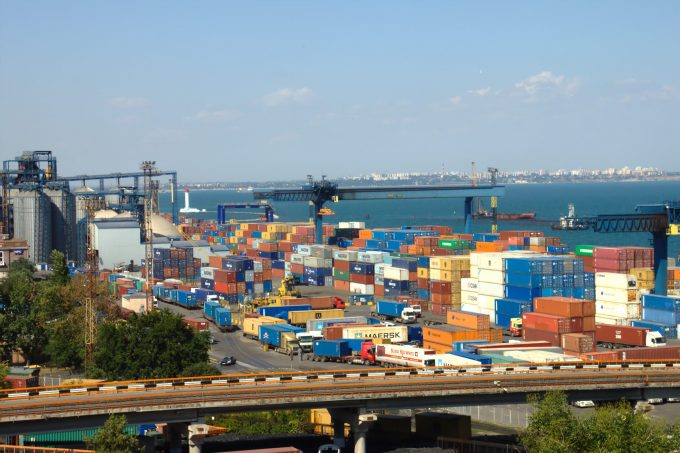RTR: Logistics giant Lineage raises $4.4bn in biggest IPO of 2024
REUTERS reports: Lineage, the world’s largest operator of cold-storage warehouses, raised $4.44 billion in its U.S. ...
TFII: SOLID AS USUALMAERSK: WEAKENINGF: FALLING OFF A CLIFFAAPL: 'BOTTLENECK IN MAINLAND CHINA'AAPL: CHINA TRENDSDHL: GROWTH CAPEXR: ANOTHER SOLID DELIVERYMFT: HERE COMES THE FALLDSV: LOOK AT SCHENKER PERFORMANCEUPS: A WAVE OF DOWNGRADES DSV: BARGAIN BINKNX: EARNINGS OUTODFL: RISING AND FALLING AND THEN RISING
TFII: SOLID AS USUALMAERSK: WEAKENINGF: FALLING OFF A CLIFFAAPL: 'BOTTLENECK IN MAINLAND CHINA'AAPL: CHINA TRENDSDHL: GROWTH CAPEXR: ANOTHER SOLID DELIVERYMFT: HERE COMES THE FALLDSV: LOOK AT SCHENKER PERFORMANCEUPS: A WAVE OF DOWNGRADES DSV: BARGAIN BINKNX: EARNINGS OUTODFL: RISING AND FALLING AND THEN RISING

The Black Sea (BSEA) grain deal brokered by the UN and Turkey that allows Russia and Ukraine to export cargo, is unlikely to be expanded or to include reduced inspection times, said a UN aid chief today.
Martin Griffiths, under-secretary-general for humanitarian affairs and emergency relief coordinator at the Office for the Coordination of Humanitarian Affairs (OCHA), told Reuters Kyiv’s call for an expansion of the deal was unlikely.
He said: “I think it would be great if it could be expanded, the more grain that gets out into the world the better clearly, from our point of view and from the world’s point of view. But I don’t think that’s immediately likely.”
Mr Griffiths’ comment came as reports suggest Russia has exported more than 500,000 tonnes of wheat via the annexed Crimean port of Sevastopol.
Any progress on expanding the deal is being hampered by Russian insistence of delaying ships at the Joint Coordination Centre (JCC) in Turkey, according to reports from crew working the vessels.
They say congestion at the JCC is caused by “Russian interference” creating obstacles for Ukrainian exports, while some empty ships have been forced to have a reinspection on spurious grounds, delaying sailings and further congesting the Bosphorus waterway.
Moreover, it is thought that the Russian inspectors have insisted on examining fully laden ships exporting grain, which, given that the inspections are meant to ensure no military equipment is imported into Ukraine, could be seen as excessive.
Daniil Melnychenko, a data analyst at Informall BG in Odessa, told The Loadstar: “Russia does not seek to mitigate the food crisis, its actions show its aim is exactly the opposite.”
According to Mr Melnychenko, Russia aims to use the JCC inspection process as a “political tool” to manipulate global grain and food markets.
Moreover, while the UN is seeking ways to include another Ukrainian port, Mykolaiv, in the BSEA deal, to help relieve the food crisis, container shipping seems to have been overlooked.
The BSEA grain deal could be extended to food and grains shipped in ocean containers, believes Mr Melnychenko, who said: “Ukraine exported staple foods in considerable quantities in ocean containers prior to the Russian invasion on 24 February.”
Informall reports that an average of 275 container loads of grain, foods and drinks, as well as vegetable oil, were exported every day from Ukrainian ports in 2021.
“Ukranian-produced staple food and grains in ocean containers are able to reach much further (geographically) due to the logistics features and benefits of using containers to deliver the food to the final destination. It is especially true for food that requires refrigeration and, in most cases, can be exported oversea only in refrigerated ocean containers.
“While Ukraine grains are shipped [in bulk only] to certain countries of Africa and the Middle East to relieve the food crisis, other landlocked destinations that used to regularly receive Ukrainian food and grains in containers abruptly lost their supplies once the country’s container terminals were blocked by Russia.”
Releasing container exports from Ukraine would address some of the food shortages, but allowing container operations remains a matter of political will, said Mr Melnychenko.
Comment on this article